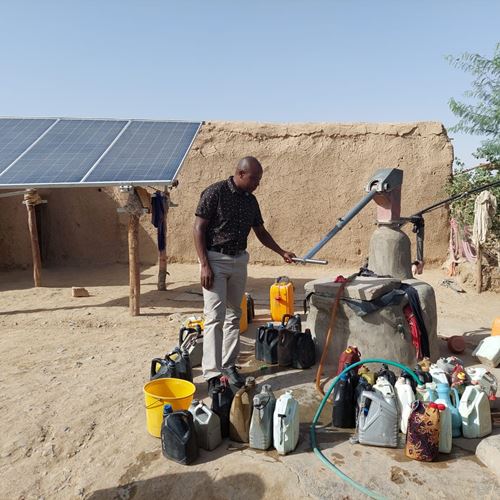Pakistan has hosted Afghans in need of safety for over 40 years, during which time significant movements of Afghans have occurred. Currently, Pakistan hosts some 3 million Afghans, including 1.4 million refugees with Proof of Registration (PoR) cards, 840,000 Afghan Citizen Card (ACC) holders and an estimated 775,000 undocumented Afghans.
Following the events of August 2021 in Afghanistan, I was deployed by DRC to UNHCR in Quetta, Pakistan in December 2021 as a Settlement Planning Officer in anticipation of large movement of people seeking international protection. In the absence of the establishment of camp settings and large-scale new arrivals, my role changed following a request by UNHCR to work as WASH Officer and support WASH activities at the same duty station where I was deployed, covering the entire province of Baluchistan. I was so excited with this new role as it gave me a very good opportunity to learn new skills in WASH and expand my knowledge.
Working as a WASH Officer has exposed me to unique challenges, and recurring drought is one of them. Rainfall has been less than one fourth of the usual levels since 2013, resulting in a water shortage throughout the Baluchistan province. Despite efforts in the past to address the issue, there remains no capacity to replenish underground water levels. In the past few decades, the underground water level has decreased from 100 feet to about 1,200 feet deep because of overexploitation that is coupled with less rain, as well as snowfall. For this reason, the government has put measures in place including restrictions on drilling of new boreholes in a bid to control and manage the underground water levels. At the moment, access to water by refugees is at the minimum standards of 20 liters per day per person, though this is threatened by the continued deepening of ground water levels. To address the threat, there are plans to drill 4 new deep boreholes with high yields and upgrade 4 other water schemes in 2022 across the refugee villages.
UNHCR colleagues that I am currently working and coordinating with (particularly from the Programme unit) are very supportive and always ready and willing to provide any relevant information that can help in ensuring that my efforts to address the water needs are successful. We are working as a team that is comprised of government line departments, UN agencies and UNHCR partners to identify WASH needs for both refugees and host community.
In addition to WASH, I also provide technical support to construction related projects in both refugee villages and host community. I have prepared various technical drawings, participated in the technical evaluation for construction projects and continue to monitor the ongoing construction projects. In 2022, there are plans to construct classrooms in 33 schools across 3 districts of Baluchistan under the Refugee Affected and Hosting Areas (RAHA) program.
When I first was made aware that I was going to Pakistan it was with mixed emotions. Of course, I was excited, but I also found myself being somehow worried when following the news about the situation in Pakistan. Luckily, I was happily surprised when I arrived, and the environment of Pakistan is very different than what I expected. I do sometimes hear the shootings mostly at night, which can be difficult, but Pakistan is still one of the best places I have ever worked. The people here are very friendly, and the hospitality is high. Also, the food is amazing. In the beginning the volume of spice shocked me, and when I asked for no spice, the food still came out way spicier than what I was used to back home. This forced me to embrace the spicy food they serve here, and I will really miss it when I get home.
As well as getting used to spicy food, I also had to adjust to the weather when first arriving to the duty station. I have never really experienced winter before, and when I arrived in Pakistan it was snowing, which I had a hard time adjusting to, as I was freezing constantly. It luckily didn’t take long before the spring came and now the average temperature is around 34 degrees. The duty station is in the biggest province, but one of the least populated in Pakistan. Fortunately, I’m in a very good working environment, where I feel supported by the people from the town, particularly the government officials that I am working with and my colleagues. I’m sure I will leave Pakistan as a different person with a lot of new experiences.
